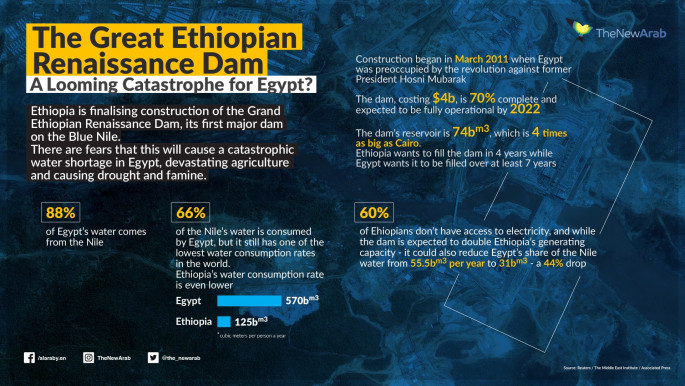Egypt says mega dam constructions will cause ‘great harm’ as Ethiopia urges return to talks
Egypt's Ministry of Irrigation and Water Resources has said that Ethiopia is taking unilateral measures regarding its bitterly disputed Great Renaissance Dam (GERD) which could cause great harm to downstream Nile countries.
The ministry released a statement on Monday evening saying that two “bottom outlets” Ethiopia had constructed on the GERD would only allow 50 million cubic metres of water to flow out of the dam per day, severely reducing the supply of water to Egypt and Sudan.
The statement followed the failure of ‘last chance’ talks in Kinshasa between Egypt, Sudan, and Ethiopia over the dam earlier this month.
It was a response to and in contradiction of a Sunday announcement by Ethiopian Irrigation Minister Seleshi Bekele, announcing that the bottom outlets had been completed.
Read more: Egypt, Sudan and Ethiopia's Nile dam dispute - A looming conflict?
Bekele said that the entire capacity of the Blue Nile could flow through the two bottom outlets, adding that they “provid[ed] assurances of flow of water to” downstream countries Egypt and Sudan that “at no time water [will be] interrupted". He also tweeted that 13 additional outlets were under construction.
|
|
Ethiopia will begin a second filling of the dam’s reservoir in July, a step which is fiercely opposed by Egypt and Sudan. Egypt says that this will reduce the amount of Nile water reaching its territory while Sudan fears that it could threaten the stability of its own Nile dams and expose millions of its citizens to flooding.
“Implementing the second filling of the dam this year, and the holding of large quantities of water in line with what the Ethiopian side has announced will greatly affect the river’s systems because the only [factor] governing the amount of water flowing out of the dam during the filling will be these bottom outlets,” the Egyptian statement said.
It added that if the annual flooding of the Nile was relatively low this year, both Egypt and Sudan would “suffer” as a result of the Ethiopian filling.
On Wednesday, Al-Jazeera reported that Ethiopian Foreign Minister Demeke Mekonnen had called on UN Security Council members to pressure Egypt and Sudan to return to African Union mediated negotiations.
In a letter to the current president of the UN Security Council, Mekonnen accused Egypt and Sudan of negotiating in bad faith and being unwilling to make necessary compromises.
Egypt and Sudan have said that besides the African Union, the US, the EU, and the UN should be involved in negotiations but Ethiopian negotiators have rejected this idea, saying that it was a stalling tactic.
Both Egypt and Ethiopia are currently engaged in intensive efforts to promote their contrasting positions on the GERD to the international community.
Egyptian Foreign Minister Sameh Shoukry is currently on a tour of African countries, which has taken him to Kenya, South Africa, and the Comoros Islands so far, in order to explain Egypt’s position on the Nile dam.
At an event organised by the Ethiopian Embassy in London last week, Mekonnen and other Ethiopian officials denounced a 1959 treaty between Egypt and Sudan dividing the waters of the Nile between these two states. Ethiopia and other upstream countries were not included in this treaty and Ethiopia maintains that it has a right to a share of Nile waters.
Egypt fears that a reduction in its share of the Nile would have catastrophic consequences, potentially leading to drought and famine. 97% of Egypt’s water comes from the river.
Follow us on Facebook, Twitter and Instagram to stay connected
![Dam filling [GETTY] Dam filling [GETTY]](/sites/default/files/styles/image_345x195/public/media/images/96F978EA-3BEE-4C37-BCEE-29274828C660.jpg?h=d1cb525d&itok=GWsR2z64)




 Follow the Middle East's top stories in English at The New Arab on Google News
Follow the Middle East's top stories in English at The New Arab on Google News
![Netanyahu furiously denounced the ICC [Getty]](/sites/default/files/styles/image_330x185/public/2024-11/GettyImages-2169352575.jpg?h=199d8c1f&itok=-vRiruf5)
![Both Hamas and the Palestinian Authority welcomed the ICC arrest warrants [Getty]](/sites/default/files/styles/image_330x185/public/2024-11/GettyImages-2178351173.jpg?h=199d8c1f&itok=TV858iVg)
